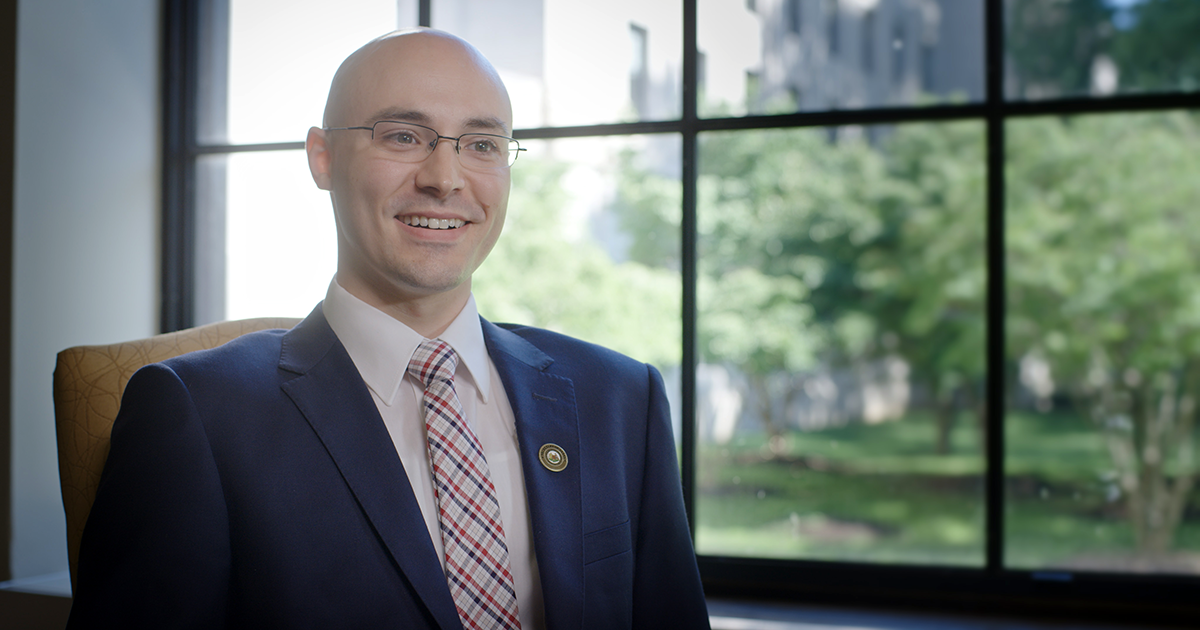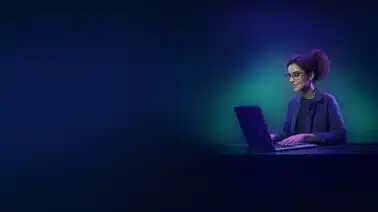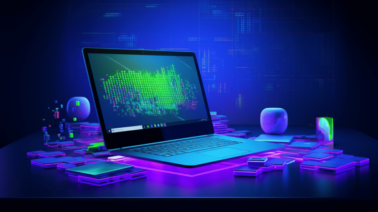West Virginia’s embrace of blockchain-powered mobile voting technology is the latest in a long line of pioneering achievements for the state.

It’s no coincidence that as we approach election day, we find ourselves talking about election technology, and it’s no surprise that we’re talking about blockchain. For its advocates, blockchain is virtually synonymous with trust and security, and that’s what successful elections are all about.
In our most recent Built on Blockchain interview, we talked with Nimit Sawhney, the Co-Founder and CEO of Voatz. Voatz is pioneering the use of blockchain technology to help overseas military personnel vote securely in West Virginia, and in our interview below, we check in with the West Virginia side of this remarkable partnership, as we talk with Donald Kersey, the Director of Elections in West Virginia.
Let’s start with talking about West Virginia itself. It seems like it’s as much a philosophy to you as it as a physical place.
We have a state motto, and it’s “Wild and Wonderful West Virginia.” There’s a clear pattern here for people who live in West Virginia, who are born and raised here, who move here. We’re wild. We’re free. We’re proud. We are a people that come together as a community no matter what we do. And we come together happily. We work hard. And we enjoy what’s around us. Not just in the industry that we have, but in the nature that we have in our state. If you’re ever here in the fall, it is one of the most beautiful places on earth. I’ve been all around the world, and I keep coming back to West Virginia.
Is it safe to say that this “wild and free” spirit informs the political process in West Virginia?
I think that’s true throughout the state, and even in state government. You see things happening all the time that cut across party lines. We don’t say, “We can’t do that because we belong to a particular party.” We look for what’s best for the American people, and what’s best for the people of West Virginia. Which is why we’re doing things like a military mobile voting solution. We are focused on the people, and not the reasons, and access to voting is the very core of our democracy.
So you’re helping to pioneer a new mobile voting solution, and it’s focused on military personnel stationed overseas. Can you tell us why you chose this group of voters?
When it comes to our uniformed services members, which is our target audience for doing this pilot project, they don’t have the same kind of access to our polling places that people here in the state do. And they don’t have scanners, or fax machines, or printers that you would need under the traditional electronic ballot delivery processes.
That’s why we were willing to break down the barriers and do something that’s completely new. And to be pioneers in this area. We found it most prudent to make sure that the people who are defending our country, who are defending our democracy, have the same rights and ability to cast their votes and make their voices heard as the people here stateside do.
As West Virginians, we have a strong history of being pioneers. We are leading the way to better technology, to better secure what we know is possible for our military men and women.
There have been questions about both the efficacy and security of absentee balloting—and even just paper balloting, for that matter—for a long time. What are the challenges to overcoming problems with the “old way” of doing things?
Our challenge was not just finding a solution to a problem that’s always existed, but a solution that was better than anything that’s ever been utilized. In other words, our challenge was finding something that we believed in, that we trusted would work, that our soldiers would buy into and use.
We had electronic ballot delivery in 2016. But we only had 20% of the eligible uniformed services members participate. That’s the problem that we tried to fix, and we believe this could be the solution. It might not be the only answer, but it’s an answer that we’ve never had before.
So IS blockchain the solution?
The reason that a public ledger like we used in this election is the most beneficial towards our goal of making sure our voter confidence isn’t sacrificed (or that the integrity of the election is sacrificed by utilizing just electronic ballot delivery, marking, and return), is because it provides transparency that a private ledger wouldn’t. In other words, at any time, someone can go and access the blockchain and see the votes that are there.
But not the content of the votes?
No, definitely not—the information within the ballots that are stored in the blockchain is not available. You can’t see who voted for who, or how a particular person is marking their ballot. But, we can see when a vote is cast. It enters the blockchain. We can verify that with the number of absentee ballot requests we’ve received for our UOCAVA (Uniformed and Overseas Citizens Absentee Voting Act) voters. We can verify that at the county level and see who actually casts a ballot. And we can see it sitting there on the blockchain. And we know that nobody’s going to be able to make any kind of alteration or addition to that blockchain without getting access to it first. And we control who has that access, we being the nodes on the blockchain.
Given that this is such a new technology, how do you get buy-in from your community?
Well, we have to be able to give our voters the confidence that while we might be doing something new, we’re doing it at a calculated risk. And we have the confidence that what we’re doing is responsible for the greater good, specifically for making sure our military men and women have the same opportunities that we do here in the states.
What role does trust play?
Trust to me is the confidence that the people who represent me, or the people that I work with, or the people that I work for, are doing what they’re saying they’re doing. Or that the technology is doing what I’m told it does. That it’s secure. That it’s transparent. That it’s auditable. To me, trust is the belief that what I’m doing is right, and that there’s no person, or entity, or organization that can come in and take away what I’m seeking to further.
To put it a little differently, trust is the confidence that what we’re doing is what our people want. And it’s what they need to have access to the ballot. And to have the confidence that the people we’re giving access to that ballot, that our uniformed services members, not only deserve it but they’re getting it in a secure way.
How do you build that confidence?
We can show our voters how difficult it would be to compromise the system. It’s nearly impossible. In fact, those are the words that the Department of Homeland Security (DHS) used during a National Association of State Elections Directors conference just this past week. That it is nearly impossible to alter, forge, or erase something once it’s on the blockchain. And if you’ve ever heard DHS talk about something, usually they say words like, “unlikely,” or “probably not.” So, when they say nearly impossible, that’s pretty good!
Has blockchain fulfilled its promise of being secure?
So far blockchain has lived up to its promise in our voting application because we haven’t found any instances where it was altered or erased or forged. We haven’t found any instances where a mal-actor came in and changed something. We haven’t found anything other than that it’s really hard to infiltrate.
Let’s talk about how you actually made this happen. Tell us about your partnership with Voatz. How did that come about in the first place?
We were approached by Tusk/Montgomery Philanthropies’ Executive Director, Sheila Nix, who knew that we were looking for an affordable solution for our state, and hadn’t been able to find one yet. She offered to explore other alternatives. We began with Nevada, because the Secretary of State of Nevada has a UOCAVA ballot delivery solution that is all electronic. But what we actually ended up discovering is that there’s a company out there, Voatz, that uses blockchain technology to secure the vote, and has won several awards. Once we learned about their company, and what they do and how they do it, we were very excited to move forward.
What did it take to actually move this idea forward, and put it into practice?
Our first steps here were to identify who was going to be a participant in a pilot. We ultimately selected two counties. One with a County Clerk who was the President of our County Clerk Association, and another who’s always been at the forefront of election innovation in West Virginia. Once we did that, we partnered them up with the Voatz team, and we made sure that the Voatz platform fit with our state’s laws and requirements as far as ballot style, timing and delivery, and things of that nature.
Once you connected the elections officials with the Voatz team, what happened next?
Voatz handed us an out-of-the-box application that had the ability to deliver a ballot to someone on their mobile device. Once we got that, our County Clerks reviewed it, and they basically told Voatz what they need out of the application, and Voatz did it. Voatz delivered the product that they needed, because have several statutory requirements that we have to follow. And it was a fairly quick process, because the Voatz team, frankly, is great!
Nimit Sawhney, Co-Founder and CEO of Voatz, has a pretty incredible story, in terms of why he does the work he does. Did his personal story impact your decision to go forward with his company?
What’s special to me about Nimit’s story is that what he says, he means. In other words, the reason why he started this company, and the reason why he embraced a technology like this, that opens access to anyone, is genuine. And I believe that the reasons that he does what he does, the reasons he works so hard, the reason that he answers the phone at two in the morning when I’ve got a voter who needs their ballot in an hour, is because he genuinely believes in democracy. And he genuinely believes in increasing accessibility to the ballot for the people who have a harder time getting it.
When we recently interviewed Nimit, we happily noted that the initial pilot had been a big success. How big of an accomplishment is that, and what does it prove?
To me what it proves, what this pilot proves is that we can do something new. That we can put ourselves out there as a pioneer, as innovators, and that our state understands why we’re doing it, and they trust us enough to get behind us. All for the same goal. What this proves is that we all have the same goal.
“We want the people who represent us in our government to be elected by the majority. We want to make sure that everybody who wants to cast a vote, everybody who wants to have their voice heard, has the opportunity to do so.”
What about your story? How does it feel for you personally, to be a part of this?
Personally, I’m proud because I’m helping continue the narrative that West Virginians go first. We have a long history of pioneers. Chuck Yeager, who broke the sound barrier. Mary Lou Retton, who won the first all-around gold medal in the 1984 Olympics in LA. Katherine Johnson, who helped make it possible to send a man to space for NASA. She did the calculations herself. I could go on and on about pioneers who were from West Virginia.
So, personally, I’m very proud to be part of this project because I am helping our state, and maybe even our nation, increase accessibility to our ballots for our uniformed services members.
Despite all the experimentation, all the exploration, all the pioneering approach to innovation, there is a very grounded spirit to the work you’re doing. You never take your eyes off the prize.
Ultimately, all we’re trying to do is make sure that the people that represent the people of West Virginia were elected by the people of West Virginia. This technology gives us the ability to open that access beyond the borders of the state. Beyond the need to have US Mail, a fax machine, a printer, all of those things. It gives us the ability to help our soldiers overseas cast their ballots as easily and as securely as possible.
Thank you Donald, for the work you’re doing, and for sharing your story with us. The students in Udacity’s Blockchain Developer Nanodegree program have made clear they’re deeply interested in real-world applications of this technology, and they have a strong commitment to social good initiatives. Your efforts, the efforts of your state, and your partnership with the team at Voatz, stand as a tremendous inspiration for them. We look forward to learning more after the next election cycle!
~


